Home » Posts tagged 'S. Pawlicki'
Tag Archives: S. Pawlicki
Polish Political Platos in Brill’s Companion
Brill’s Companion to the Legacy of Greek Political Thought edited by David Carter, Rachel Foxley, and Liz Sawyer is one of the latest volumes in the series (vol. 8, Leiden-Boston 2024). Contributors to this volume investigated a range of responses to issues surrounding the legacy of Greek political thought, exploring the ways in which political thinking has evolved from antiquity to the present day.
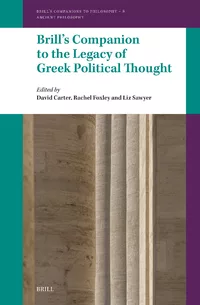
One of the chapters in this book was authored by Tomasz Mróz who discussed variety of Polish interpretations of Plato’s political works in studies written by nineteenth-century Polish authors (Plato’s Political Works in Nineteenth-Century Polish Thought, pp. 335-363), including historians of philosophy, philosophers and social thinkers. Their diverse views on the Republic of Plato reflected the wealth of ideas which are present in Plato’s opus. In spite of their various intellectual backgrounds and goals, all these authors found inspiration in Plato’s work for the implementation of his political ideas into their own arguments touching upon contemporary social or political issues, including the questions of democracy, socialism and gender equality.
Let’s say a few words about the authors presented in Mróz’s chapter to give a glance of its content: Bolesław Limanowski (1835-1935), a socialist thinker, regarder Plato as a progressive philosopher, despite his disregard for democracy. For Wojciech Dzieduszycki (1848-1909), a conservative politician, Plato’s socialist and feminist ideas were too destructive for society to be implemented. Wincenty Lutosławski (1863-1954), a famous Plato scholar, considered Plato’s socialism as a natural consequence of his metaphysics and only a transitional step in his development. Stefan Pawlicki (1839-1916), a neo-Scholastic philosopher, claimed that even Plato’s most controversial political ideas (communism and feminism) had stemmed from his deep moral beliefs, but all their shortcomings were later to be corrected by Christianity. Eventually, Eugeniusz Jarra (1881-1973), a historian of legal philosophy, emphasised gender equality and the possibility of social promotion as progressive ideas supporting democracy.
PS.: this chapter was edited and improved by Una Maclean-Hańćkowiak and is presented on Kudos platform.
Neverending Story of… Plato in Poland
This time it was at the University of Hradec Králové where the word about Plato reception in Poland was spread. Tomasz Mróz, among his activities in accordance with Erasmus+ Teaching Assignment, delivered a talk on political aspects of Plato reception in Poland. The focus was, naturally, on Plato’s Republic and on the connections between the interpretations of Plato’s political philosophy and the political situation of Poland from the 19th century to the post World War II era. This talk was delivered for international students enrolled in a course: Ancient Greek Democracy and Its Legacy taught in UHK by professor Jaroslav Daneš, with whom AΦR research group has successfully co-operated for many years.
The topics covered in this talk included a brief overview of how political situation of Poland changed and how various researchers of Plato interpreted his political ideas. The lecture started with Bolesław Limanowski (1835-1935), an advocate of socialism, who used Plato’s ideas as an evidence that socialism had been present in European thought from its very beginning. The next was Wojciech Dzieduszycki (1848-1909), a conservative politician, who ridiculed gender equality and socialism as political phantasies. Wincenty Lutosławski (1863-1954) considered totalitarian character of Plato’s polis as a natural consequence of his idealism, but after the World War II emphasised Plato’s evolution and his affinity to Christianity. Stefan Pawlicki (1839-1916), a Christian thinker rejected the connection between socialism and Plato, but praised the idea of preventive censorship. At the dawn of Polish independence after World War I Eugeniusz Jarra (1881-1973) welcomed the idea that social promotion or demotion in the state should depend on personal capabilities, and that the elites should no longer consist of the members of aristocracy but of the most gifted individuals. After World War II, in the Stalinist period, the criticism of Plato stemmed from various premises. Tadeusz Kroński (1907-1958), on the one hand, a Marxist thinker, considered Plato’s political philosophy as an aristocratic reaction to democratic changes in Athens, and in general as an expression of obscurantism and religiosity. Władysław Witwicki (1878-1948), on the other hand, was apparently critical towards Plato’s political project, assessing it as a monastery, concentration camp and a totalitarian state, but actually it was a criticism in disguise of the then political system.
In spite of the fact that the history of Poland or Polish philosophy was completely new for the members of the audience, their questions and remarks demonstrated that they were able to see the relations between the views of Plato’s interpreters and their interpretations of Plato’s Republic. Moreover, as usually, the discussion was the evidence that more general issues related to Plato’s legacy remain topical and stimulating as, for example, the chronology of Plato’s dialogues or reliability of image of Socrates.
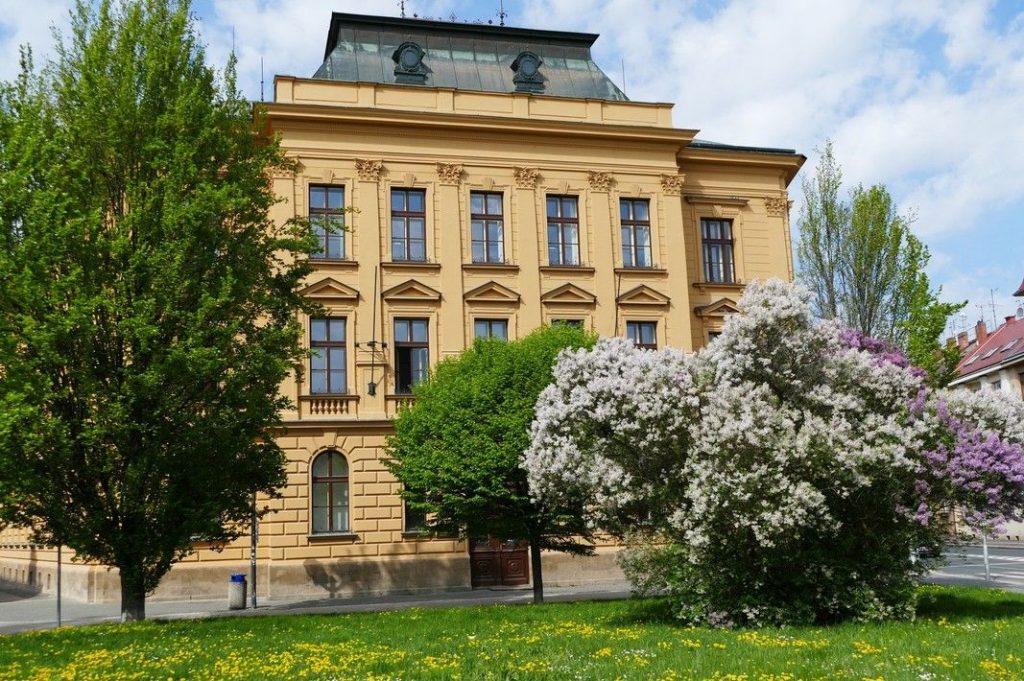
Stefan Pawlicki on Greek Concepts of Human Soul
On March 15th-16th 2025 the first conference of the Academic Club for Ancient Philosophy (Koło Naukowe Filozofii Starożytnej) at the University of Warsaw took place. This academic event was organised by young enthusiasts of ancient thought and gathered scholars from various Polish universitites, and students interested generally in the topic of body and soul or in the subjects of individual papers, the list of which can be found here.
AΦR, naturally, was present at the conference. Tomasz Mróz delivered a paper titled Stefan Pawlicki on the concepts of soul in Greek philosophy. Pawlicki (1839-1916) was once in his career a professor of philosophy in Warsaw, but Mróz’s paper was focused on mature period of his career, when he was a respected professor in Cracow and the author of History of Greek Philosophy. Volume I of this book appeared in print in 1890 (front page on the right) and was the first Polish handbook for ancient philosophy, while the volume III, meant to be devoted to Aristotle, was not finished by the author.
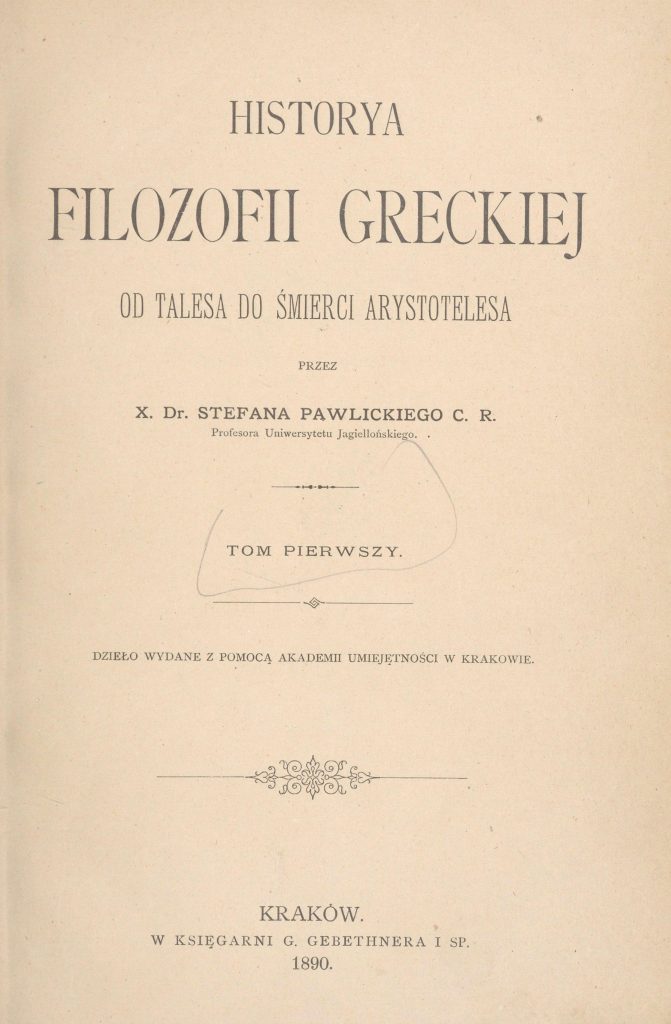
Pawlicki was an admirer of Plato, but instead of presenting well-known opinions of Pawlicki on Plato, Mróz discussed Pawlicki’s criticism of the pre-Socratic thinkers. Pawlicki was a historian of philosophy who aimed not only to provide the readers with an account of the ideas of Greek thinkers, but considered the needs of the Polish reading audiences and supplemented his discussion of the Greeks with assessments and evaluations presented from the Catholic standpoint.
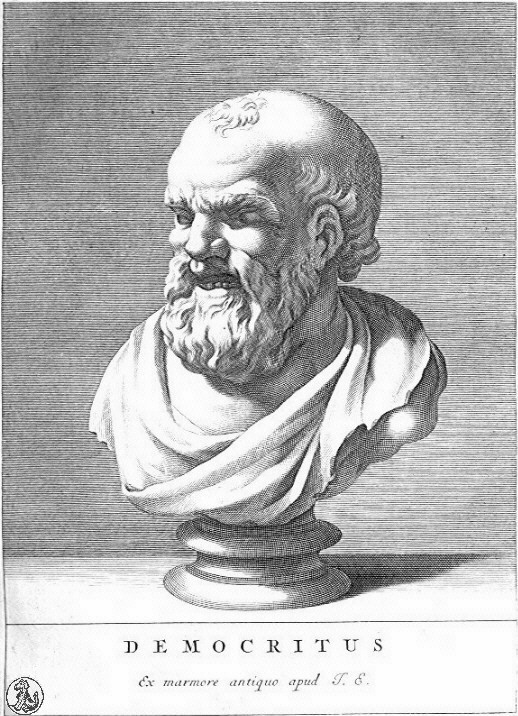
One of Pawlicki’s methods was to draw far reaching conclusions from the fragments of the pre-Socratic thinkers, especially materialist philosophers like Democritus, and then present them as unacceptable. For example, he stressed pantheist traces in Heraclitus and pessimism of Democritus, while at the same time he seemed to appreciate the concept of reincarnation and Pythagorean ethics, as encouraging human beings to improve themselves.
His arguments against most of the Greek concepts of human soul allow to structure them in order of perfection, starting with Aristotle (whom Pawlicki did not manage to present), followed by Plato and Socrates, with Pythagoreanism below, and ending with Heraclitus and Democritean materialism, which was – just like 19th century materialists – a constant subject of Pawlicki’s critical remarks.
AΦR at the 3rd Congress on Polish Philosophy
The 3rd Congress on Polish Philosophy took place in October (18th-20th) in the Rydzyna Palace. It gathered scholars interested in researching the tradition of Polish philosophy and developing it. Two members of the Ancient Φilosophy Reception research group took part in this philosophical event: Adrian Habura – online, and Tomasz Mróz – onsite. The first of them spoke about the concept of love in the works of Władysław Tatarkiewicz (1886-1980), while the latter – on the history of studies on the reception of ancient philosophy in Poland.
Mróz’s paper was directly concerned with problems related to the reception of ancient philosophy and started with quotes of diverse opinions of two eminent Polish researchers in the history of Greek philosophy, that is, Stefan Pawlicki (1839-1916) and Wincenty Lutosławski (1863-1954). Lutosławski, when composing his works on Plato, searched for Polish authors and their studies to provide references to them, while Pawlicki paid no interest to the works of his compatriots on Greek philosophy.
In more recent decades it was Izydora Dąmbska (1904-1983), a philosopher and historian of philosophy, who published a study on the reception of Plato in Poland (1972), but nowadays many books and papers on this topic were published by the members of the AΦR research group. Concluding his talk Mróz briefly presented research projects of the members of the AΦR and the books they had published, to start with the latest one:
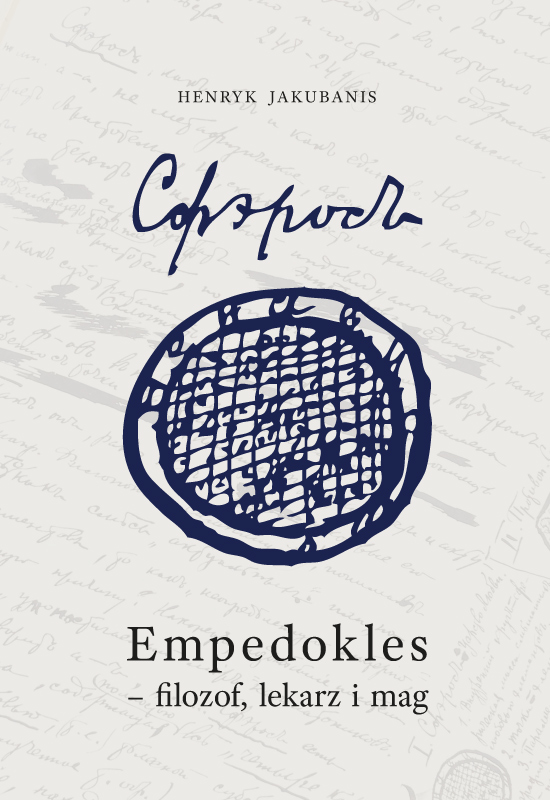
Henryk Jakubanis, Empedokles – filozof, lekarz i mag: Przyczynek do jego zrozumienia i oceny (Empedocles: a Philosopher, a Doctor and a Magus. Materials for Understanding and Assessing Him), transl. from Russian and ed. Mariam Sargsyan, A. Habura, Wydawnictwo Marek Derewiecki, Kęty 2024, 104 pp. (Studies and Texts in the History of Reception of Ancient Philosophy, vol. 3).
T. Mróz, Stanisław Lisiecki (1872-1960) i jego Platon (Stanisław Lisiecki (1872-1960) and His Plato), Wydawnictwo Marek Derewiecki, Kęty 2022, 150 pp. (Studies and Texts in the History of Reception of Ancient Philosophy, vol. 2).
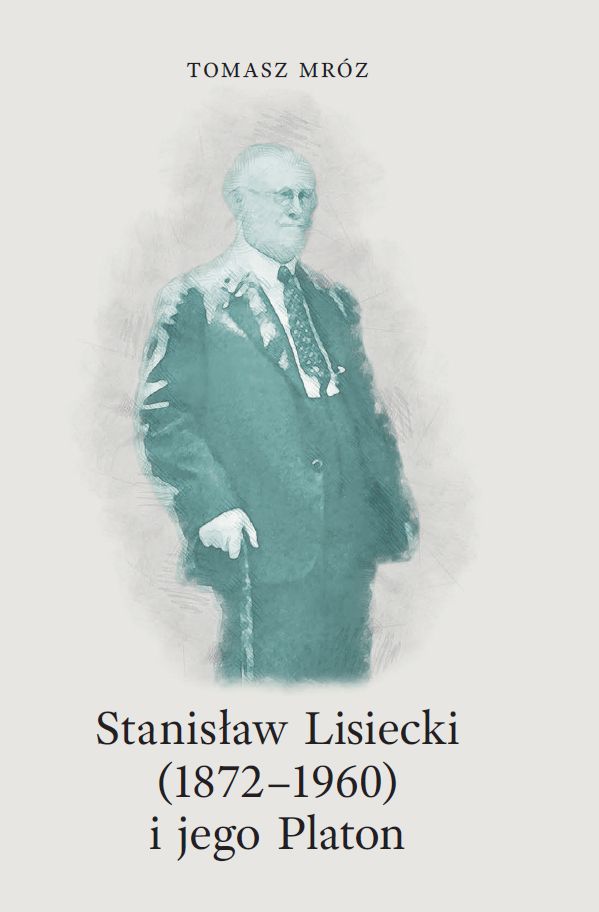
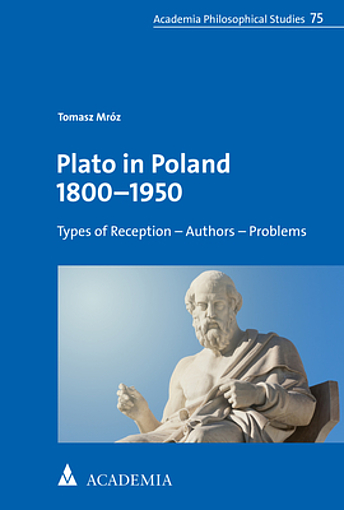
T. Mróz, Plato in Poland 1800-1950: Types of Reception – Authors – Problems, Academia Verlag / Nomos Verlagsgesellschaft, Baden Baden 2021, 480 pp. (Academia Philosophical Studies, vol. 75).
S. Lisiecki, O Platonie, Arystotelesie i o sobie samym (On Plato, Aristotle and on Himself), ed. T. Mróz, Wydawnictwo Marek Derewiecki, Kęty 2021, 367 pp. (Studies and Texts in the History of Reception of Ancient Philosophy, vol. 1).
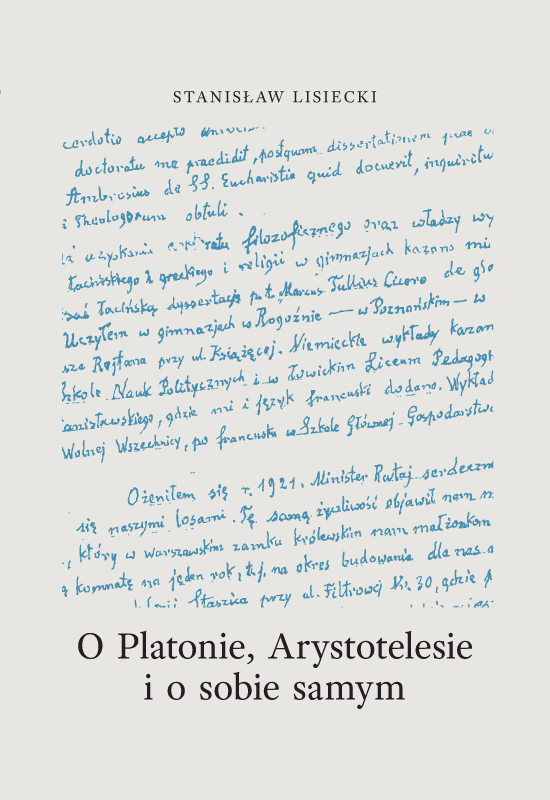
and some earlier ones…
Plato in Poland book available in OA

This post is only to announce that the book by T. Mróz, Plato in Poland 1800-1950. Types of Reception – Authors – Problems (Academia Verlag/Nomos Verlagsgesellschaft, Baden Baden 2021), as a result of the agreement with the publisher, is now available free in open access on the Nomos Verlag website here and in the repository of the University of Zielona Góra, here. Enjoy!
History of Philosophy in Poland in Martin-Luther-Universität Halle
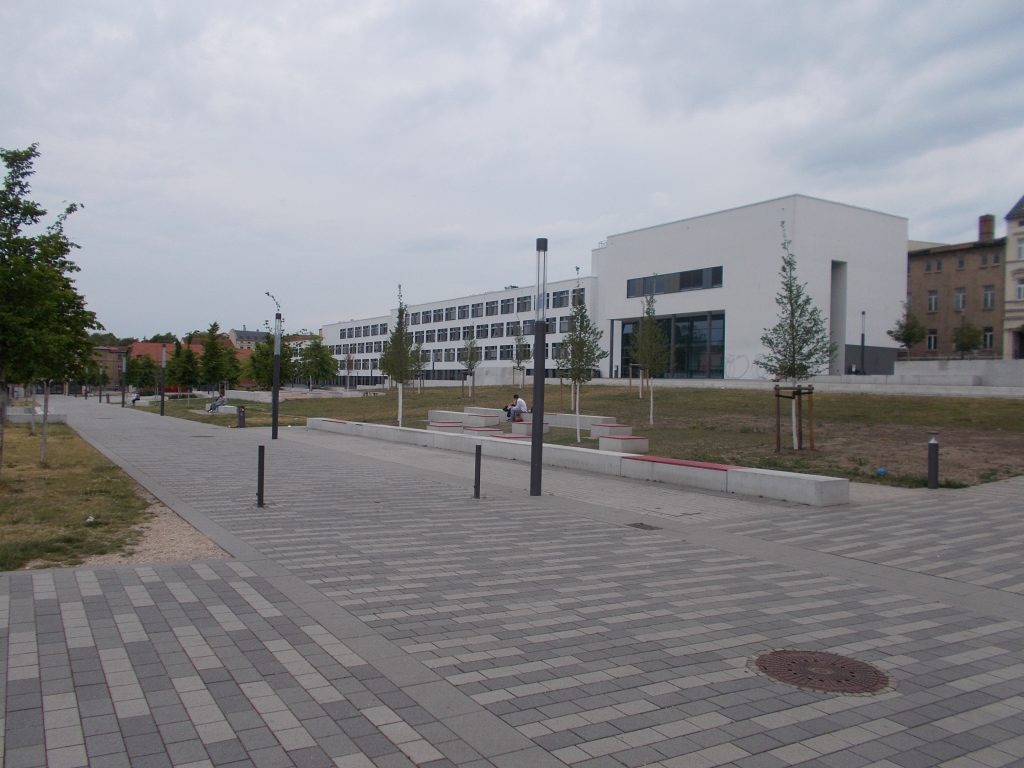
Selected Topics in the History of Philosophy in Poland was the title of the course, which was delivered in May and June 2022 by Tomasz Mróz for the students of Martin-Luther-Universität (MLU) Halle in the building of the Steintor Campus (on the left). T. Mróz was appointed at MLU as Gastprofessor (funded by Deutscher Akademischer Austauschdienst DAAD) for a month at the Aleksander-Brückner-Zentrum für Polenstudien (Institut für Geschichte).
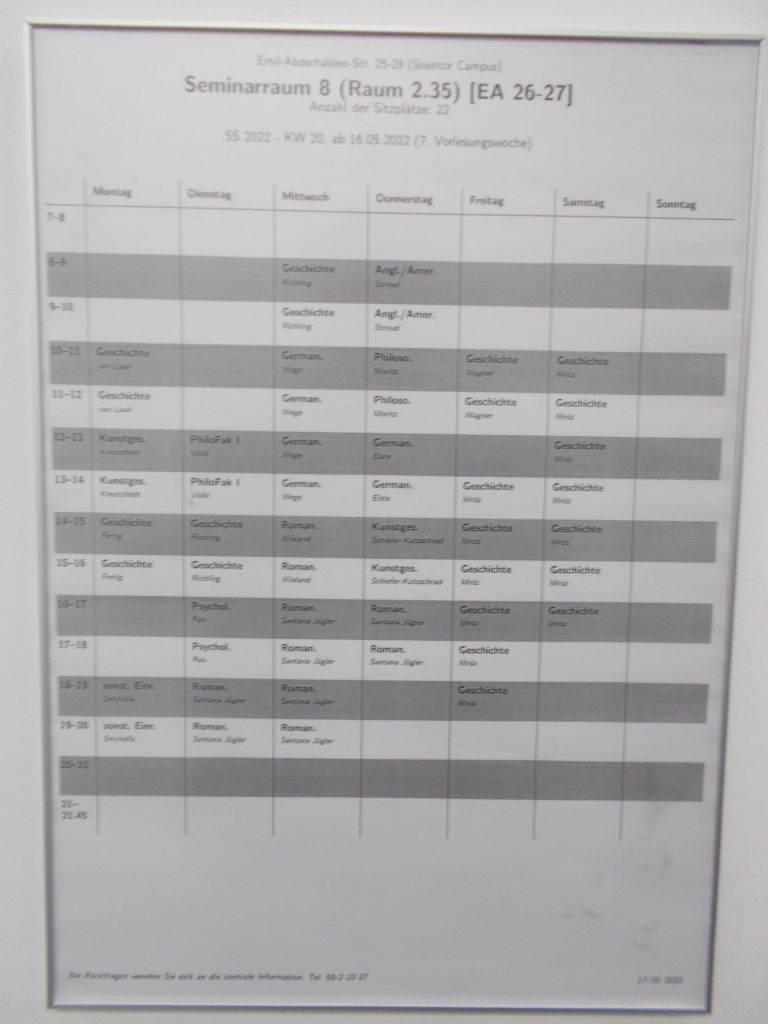
The course had a form of “Blockseminar” meetings and consisted of lectures, seminars and students’ presentations, focusing on various ideas, currents and problems in the history of philosophy in Poland. A course like this could not, obviously, do without a closer insight into some issues of ancient philosophy reception. For example, reception of Aristotle’s philosophy of nature in Vitello’s theory of demons and Pythagorean and Platonic inspirations in Copernicus were discussed. During one of the final lectures the problems of Plato reception in Poland were presented, as they were previosuly structured in the book Plato in Poland 1800-1950. The works of the following authors were briefly examined: A.I. Zabellewicz, F.A. Kozłowski, W. Tatarkiewicz, P. Semenenko, B. Limanowski, W. Dzieduszycki, E. Jarra, S. Pawlicki, W. Lutosławski, S. Lisiecki and W. Witwicki.
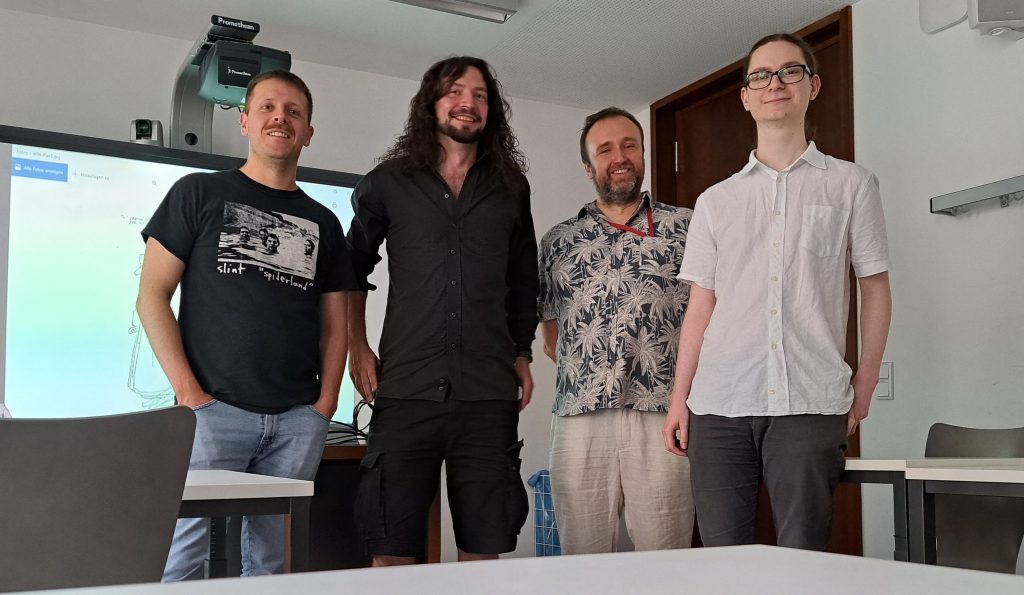

All the students attending the course in Polish philosophy should be thanked for their dilligence, co-operation and their presentations. The lectures, however, wouldn’t have taken place without the granting decision of professor Yvonne Kleinmann, who holds a chair in the East-European history at MLU and is the head of the Aleksander-Brückner-Zentrum für Polenstudien, and without co-ordinating work of doctor Paulina Gulińska-Jurgiel, to both of whom the lecturer is extremely grateful.
A View of Plato’s Paths in Poland
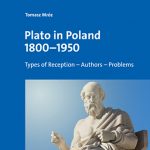
A lengthy, 480 pages, monograph book by T. Mróz was published in Academia Verlag’s series “Academia Philosophical Studies” as vol. 75. The title of the book is Plato in Poland 1800-1950. Types of Reception – Authors – Problems.
Some material from the book, including table of contents, is available on publisher’s website. The book attempts to make Polish Plato reception available to non-Polish readers. The years 1800-1950 cover essential phaenomena in modern Polish philosophy, for they encompass periods of reception of Western philosophical trends and the development of the Lvov-Warsaw school, neo-Messianism and neo-Scholasticism. The book discusses how each of these phaenomena contributed to interpreting Plato. The material is divided into three main parts focused on various types of reception.
The book is a final outcome of a project sponsored by Polish government within the National Programme for the Development of Humanities funding scheme. An essential collaborator in this project was Una Maclean-Hańćkowiak, who patiently edited the author’s style.
Recent commentaries